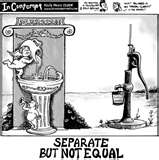Cards In This Set
| Front | Back |
|
Marybury v. Madison
|
Formed the basis for judicial review. First time the court declared something unconstitutional. Court declared Madison should recieve comission but court could not force marybury to give it.
|
 McCulloch vs. Maryland |
Maryland tried to open a second bank of the U.S. Court declared that the U.S. could open a bank in any state.
|
 Gibbons vs, Ogden |
Court declared the power to regulate interstate commerce was declared to congress.
|
 Plessy vs. Ferguson |
Court declared that whites and blacks had to be seperated but given equal treatment. "seperate but equal"
|
 Brown vs. Board of education |
Court declared it was unfair to give black children less educational oppurtunities.
|
|
Roe vs. Wade
|
Court declared that an exspecting mother can only have an abortion up to the time the baby would be able to live outside the mothers womb. Created pro-life and Pro-choice groups.
|
 Mapp vs. Ohio |
Court declared that if evidence is found While conducting an unreasonable search and seizure it cannot be used as evidence in court.
|
 Miranda vs. Arizona |
Miranda Rights. A person in custody has to be warned of their rights. If not warned of their rights information before that cannot be used in court.
|
 Gideon vs. Wainwright |
Court unanimously declared that if a person cannot afford an attourney one has to be assigned their case y the gov.
|
 Tinker vs. Des Moines |
Defines the constitutional rights of students. Is stil being used today to determine whether a school's disciplinary actions violate their fisrt amendment rights.
|
 Engel vs. Vitale |
Courts declared that it is unconstitutional for a state worker to compose an official school prayer.
|
 Texas vs. Johnson |
Johnson felt that burning the flag was part of his rights. the court declared that it was is protected right under the first amendment to burn the flag to express his freedom of speech.
|
 Furman vs. Georgia |
Case led to "de facto moratorium." Court agreed on the requirement for a degree of consistency in the application of the death penalty.
|



